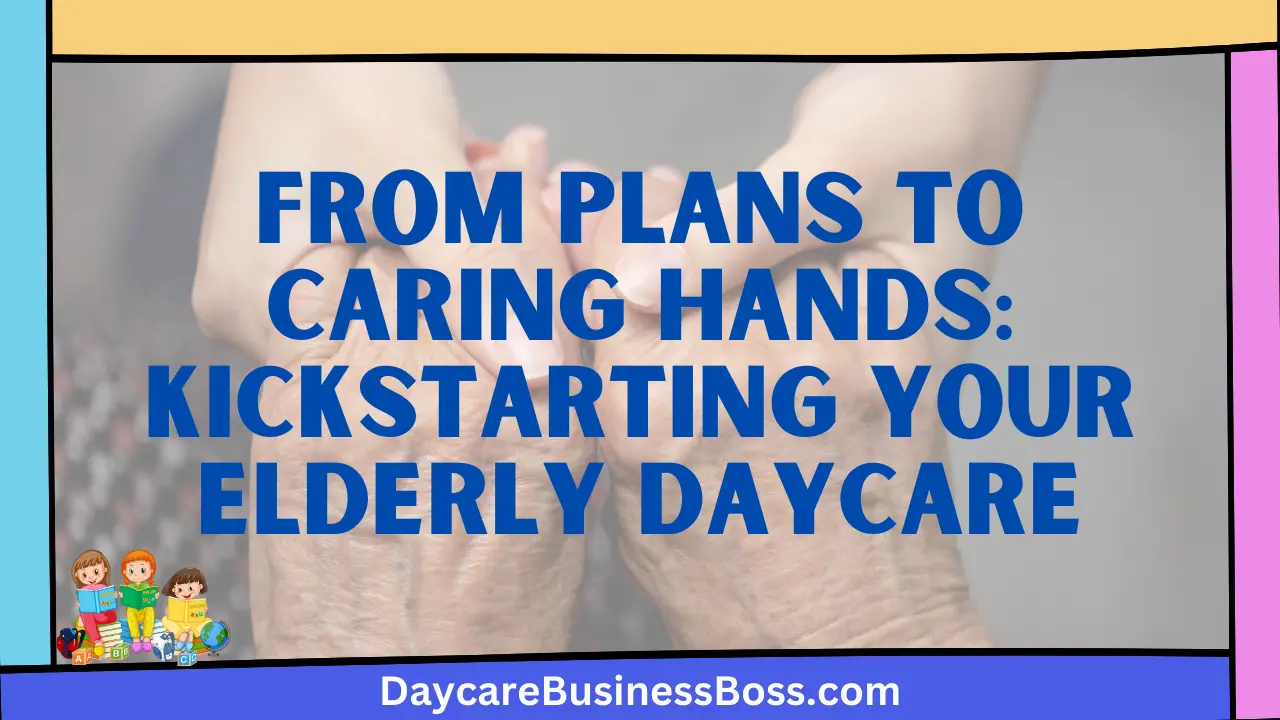In a world where the aging population is growing, the demand for quality aged care services has never been greater. Starting an elderly daycare business not only provides a fantastic opportunity for entrepreneurs but also meets a critical need in our communities. This enterprise goes beyond traditional entrepreneurship by establishing a safe sanctuary for elders to prosper, socialize, and receive the care they require.
To start an elderly daycare business, you should create a detailed business plan, secure necessary permits, find a suitable location for seniors, design safe and comfortable spaces catering to seniors’ needs, hire trained staff, establish caregiving protocols, and promote your services through local channels.
Create a Detailed Business Plan

Any entrepreneurial journey requires the establishment of a well-written business plan. This strategic document serves as an elaborate map, charting the course of your business endeavors. It includes a slew of essential factors such as your business goals, tactical maneuvers, target demographics, financial projections, and operational procedures.
In the case of starting an elderly daycare business, your blueprint should demonstrate a thorough understanding of the particular demands of older persons, as well as how your services are tailored to meet these needs. Consider the variety of enriching activities you will provide, the operational hours that are suitable for elders, and the possibility of forming alliances with healthcare professionals or local establishments. This multidimensional company plans not only guides the course of your decisions but also acts as a powerful magnet, enticing possible supporters or financial backers who desire extensive deliberation.
A thoroughly constructed business plan is the foundation of each business start-up. This plan must be embellished with insights that demonstrate empathy, expertise, and a comprehensive understanding of the aging demographic within the context of elder care. This type of roadmap not only guides you through the competitive market currents but also tells a fascinating story that entices stakeholders, promoting the transformation of visionary conceptions into thriving realities.
Read more about: From Dream to Reality: Your Daycare Business Plan Unveiled
Secure Necessary Permits and Licenses
The running of an elderly daycare business necessitates precise compliance with a slew of rules and licensing. Navigating the complex regulatory landscape is a must for every business owner entering this industry. The geographical context is critical, as different locations demand specialized permits across the fields of healthcare, safety protocols, and overall economic endeavors. Thorough research covering local, state, and federal requirements is essential, serving as a guidepost to ensure strict adherence to all mandatory standards.
These prerequisites cover a wide range of approvals, including but not limited to zoning permits, health department licenses, and rigorous fire safety examinations. It is critical to pay close attention to these legal requirements, since failure to obtain the required permits may result in a slew of legal complications and difficulties in the future. As a result, it is the entrepreneur’s responsibility to create the groundwork for their enterprise in a way that complies with the normative legal framework, limiting the risk of regulatory non-compliance.
Find a Suitable Location for Seniors
Choosing the best location for your elderly daycare center is a critical factor in its achievement. This option is appealing not only for its practicality but also for its ability to foster a peaceful environment for seniors and their families. The search for an appropriate venue in this endeavor comprises a range of issues that collectively form the groundwork for a flawless encounter.
The emphasis on accessibility is critical in this equation, both for senior consumers and their loved ones. Proximity to residential areas, combined with easy access to public transportation, helps to develop a sense of ease and inclusivity. The availability of parking spots complements this user-friendly environment, allowing for hassle-free visits.
Aside from logistical considerations, the physical infrastructure itself is important. An ample room is required to support a variety of activities, dining areas, and comfortable rest areas. Prioritizing well-lit spaces is critical since it contributes to a pleasant atmosphere and removes potential hazards. Wheelchair accessibility emphasizes inclusivity, displaying a commitment to meeting a wide range of needs. With features such as handrails and non-slip flooring, seniors’ security is enhanced while the chance of accidents is reduced.
Design Safe and Comfortable Spaces
A cornerstone of an elderly daycare center’s purpose is to create a safe and welcoming environment. Recognizing the various problems that senior citizens may have, from reduced mobility to impaired vision and underlying health concerns, highlights the importance of modifying the facility’s architecture to accommodate these specific needs. This project combines functional accessibility with the promotion of comfort and well-being.
Inclusive design components take center stage, seamlessly incorporating features such as ramps, generously scaled doorways, and low-step entries. These measures allow those who rely on wheelchairs or walkers to move freely, boosting independence and minimizing physical impediments.
Lighting’s importance cannot be emphasized in tandem. Adequate lighting improves visibility greatly, especially for the elderly with deteriorating eyesight. Lighting fixtures are strategically placed to provide an ambient glow in every corner, encouraging a sense of security and lowering the likelihood of accidents.
While practicality is important, the elderly’s emotional and psychological requirements are equally important. As a result, pleasant sitting configurations and calm spaces for leisure become inherent aspects of the design. These tranquil getaways provide seniors with quiet thought and respite, enhancing their sense of contentment and well-being.
Catering to Seniors’ Needs
Elder care involves a wide range of distinct needs, ranging from medical attention to developing social relationships. A varied range of activities is essential for cultivating a complete and nurturing environment within your daycare center. This mosaic of activities appeals to the many facets of seniors’ lives, from physical vitality to cognitive vibrancy and emotional pleasure.
It is critical to carefully curate activities. Promoting physical well-being includes planning workouts that are adapted to the capacities of the elderly. These mild activities not only increase mobility but also boost their sense of vigor. Cognitive stimulation is essential in tandem. Memory games, for example, test the intellect, sparking neuronal connections and retaining mental agility.
Nurturing emotional health is still critical. Arts and crafts, for example, not only provide artistic expression but also function as therapeutic undertakings, promoting a sense of accomplishment. Music therapy’s transforming potential resonates deeply, prompting memories and feelings that transcend language.
Collaboration with healthcare professionals is a key component of this comprehensive strategy. Regular health check-ups guarantee that elders’ well-being is closely monitored, while medication management ensures that treatment programs are followed. This collaboration combines medical practitioners’ knowledge with the loving environment of the center, fostering a sense of trust and security.
Hire Trained Staff

The level of your workforce is the crux of achievement for your elderly daycare business. The selection of caregivers and activity coordinators is critical, as these professionals are responsible for adhering to the unique needs of elders. This team’s basis should be made up of seasoned specialists with a thorough understanding of the aging population. This grasp goes beyond simple experience and includes an understanding of the special needs of the aged.
Attributes like patience, sensitivity, and great communication skills should be top priorities in your hiring process. These characteristics serve as the foundation for genuine connections with seniors, building friendships based on trust and understanding. Recognizing that aged care is multidimensional, you may need licensed medical professionals, especially in areas where specialist care is required. These professionals play an important role in providing elders with the specialized medical care they require.
However, the journey does not end with hiring; it continues into a domain of constant growth. Regular training sessions are essential for keeping your employees up to date on the newest innovations and best practices in aged care. This continual education not only improves their skill set but also demonstrates your center’s dedication to excellence.
Read more about: A Step Ahead: How to Begin Your Licensed Daycare Endeavor
Establish Caregiving Protocols
Maintaining a pleasant and stable caring atmosphere within your elderly daycare center is critical for the holistic well-being of elders. The construction of consistent caring protocols that map a route of consistency, safety, and attentiveness strengthens this foundation. These rules serve as a guidepost for your employees in creating a safe and supportive environment for the elderly.
The articulation of procedures and safety precautions is a cornerstone of these protocols. The distinct separation of daily routines and processes provides seniors with a sense of dependability and comfort. Safety guidelines include protocols to be followed in the event of an emergency, informing seniors and their families that their safety is being closely monitored.
Medication administration and reaction to medical emergencies are essential aspects of caregiving. Protocols explaining these behaviors are essential for ensuring that elders receive the necessary therapies appropriately and efficiently. Guidelines that cover everything from dressing and grooming to feeding create a continuum of care that respects their dignity and autonomy.
These protocols, however, are not static things; they are dynamic texts that change to incorporate best practices. Regular evaluations and updates are required to demonstrate your commitment to improving the quality of service provided. Importantly, a workplace with open lines of communication among staff members creates a unified caregiving fabric. This cohesion ensures that the caregiving method remains harmonious, allowing staff to collaborate and harness collective experience for the benefit of the elders they serve.
Promote Your Services Through Local Channels
Developing a strong strategy to promote your elderly daycare services in the community is critical to attracting new clients to your facility. At the heart of this endeavor is a strong online presence, which serves as a portal for connecting with your target demographic. This begins with a sleek website that reflects your professionalism and distributes critical information. Complementing this is a purposeful use of social media platforms to disseminate intelligent information emphasizing the benefits of your services, the expertise of your team, and the unique activities you provide.
Forming ties inside the community fabric strengthens your outreach efforts. Connect with local elder centers, retirement communities, and medical facilities to form beneficial collaborations that result in recommendations. These partnerships cast a wider net, establishing your center as a reliable resource in the local senior care ecosystem.
Concurrently, sponsoring educational courses and seminars solidifies your center’s expertise, educating the community while highlighting your capabilities. These events provide a venue for elucidating the subtleties of geriatric care, demonstrating your commitment to encouraging informed choices. Such efforts allow for direct involvement with prospective clients and their families, establishing a rapport based on trust and knowledge.
Frequently Asked Questions

What is the first step in starting a daycare for the elderly?
Creating a comprehensive business plan is the first step in starting an elderly daycare service. This plan details your company’s objectives, target audience, services provided, operational procedures, and financial projections. A well-structured business plan acts as a roadmap for your venture, assisting you in securing funds, making educated decisions, and staying on track to meet your goals.
What licenses and permits are necessary to run an elderly daycare center?
Operating an elderly daycare center necessitates adherence to several regulations as well as the acquisition of essential licenses and permissions. The particular requirements differ according to your area and the services you provide. In general, zoning permits, health department licenses, fire safety inspections, and possibly medical licenses are required if you provide medical care. To maintain compliance and avoid legal complications, it’s critical to research local, state, and federal regulations.
How can I make my daycare facility a secure and comfortable environment for seniors?
Creating a secure and comfortable workplace for elders necessitates careful consideration of their specific requirements. Consider accessibility elements such as ramps, wide doorways, and non-slip flooring for mobility aids. Adequate lighting and contrasting colors can help persons with vision impairments see better. It is also necessary to provide comfortable sitting, quiet areas for relaxation, and easily accessible bathroom facilities. Regular safety checks and emergency procedure training for employees also contribute to a safe atmosphere.
To learn more on how to start your own daycare checkout my startup documents here.
The information provided by DaycareBusinessBoss.com (“The Site”) is for general informational purposes only. All information on the Site is provided in good faith, however, we make no representation or warranty of any kind, express or implied, regarding the accuracy, adequacy, validity, reliability, availability or completeness of any information on the Site. Under no circumstance shall we have any liability to you for any loss or damage of any kind incurred as a result of the use of the Site or Reliance on any information provided on the Site. Your use of the Site and your reliance on any information on the Site is solely at your own risk.
This blog post is for educational purposes only and does not constitute legal advice. Please consult a legal expert to address your specific needs. Terms and Conditions. (https://daycarebusinessboss.com/terms-conditions/)

Meet Shawn Chun: Entrepreneur and Childcare Business Fan.
I’m a happy individual who happens to be an entrepreneur. I have owned several types of businesses in my life from a coffee shop to an import and export business to an online review business plus a few more and now I create online daycare business resources for those interested in starting new ventures. It’s demanding work but I love it. I do it for those passionate about their business and their goals. That’s why when I meet a childcare business owner, I see myself. I know how hard the struggle is to retain clients, find good employees and keep the business growing all while trying to stay competitive.
That’s why I created Daycare Business Boss: I want to help childcare business owners like you build a thriving business that brings you endless joy and supports your ideal lifestyle.


